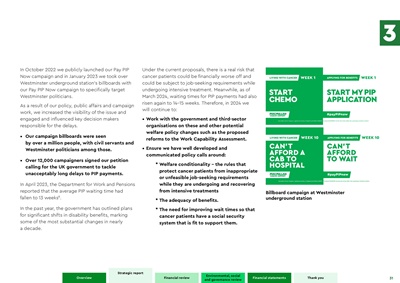
Under the current proposals, there is a real risk that
cancer patients could be financially worse off and
could be subject to job-seeking requirements while
undergoing intensive treatment. Meanwhile, as of
March 2024, waiting times for PIP payments had also
risen again to 14-15 weeks. Therefore, in 2024 we
will continue to:
• Work with the government and third-sector
organisations on these and other potential
welfare policy changes such as the proposed
reforms to the Work Capability Assessment.
• Ensure we have well developed and
communicated policy calls around:
* Welfare conditionality - the rules that
protect cancer patients from inappropriate
or unfeasible job-seeking requirements
while they are undergoing and recovering
from intensive treatments
* The adequacy of benefits.
* The need for improving wait times so that
cancer patients have a social security
system that is fit to support them.
In October 2022 we publicly launched our Pay PIP
Now campaign and in January 2023 we took over
Westminster underground station's billboards with
our Pay PIP Now campaign to specifically target
Westminster politicians.
As a result of our policy, public affairs and campaign
work, we increased the visibility of the issue and
engaged and influenced key decision makers
responsible for the delays.
• Our campaign billboards were seen
by over a million people, with civil servants and
Westminster politicians among those.
• Over 12,000 campaigners signed our petition
calling for the UK government to tackle
unacceptably long delays to PIP payments.
In April 2023, the Department for Work and Pensions
reported that the average PIP waiting time had
fallen to 13 weeks8.
In the past year, the government has outlined plans
for significant shifts in disability benefits, marking
some of the most substantial changes in nearly
a decade.
Billboard campaign at Westminster
underground station
31
Environmental, social
and governance review
Financial review
Strategic report
Overview Financial statements Thank you
13